Abstract
Male rabbits received 20 micrograms/ml of cadmium in drinking water for nine months. At the end of the treatment aortic vascular resistance was increased, whereas maximum rate of increase in left ventricular pressure, aortic blood flow, stroke volume, cardiac output, left ventricular minute work, and left ventricular stroke work were reduced. Arterial blood pressure, heart rate, and the index of myocardial oxygen consumption were not modified. The exposed rabbits also showed reduced pressor responses to vagotomy, increased cardiovascular responses to angiotensin I and II and isoprenaline, and lower responses to serotonin and guanethidine; the bradycardia induced by clonidine was augmented; the cardiovascular effects of bilateral carotid occlusion, hexamethonium, phenylephrine, histamine, acetylcholine, tyramine, papaverine and verapamil were unaltered. In the treated rabbits cadmium was appreciably higher in the kidney than in the heart; however, renal concentrations of cadmium were lower than those reported as critical for workers exposed to cadmium. Zinc was increased in the kidney but not in the heart, whereas copper remained unchanged in the examined organs. In rabbits treated with cadmium the increased aortic vascular resistance and the reduced myocardial contractility contribute to preserve a haemodynamic equilibrium without alteration of blood pressure and heart rate; the question of whether a similar condition may be present in people exposed to cadmium with normal cardiovascular parameters is discussed.
Full text
PDF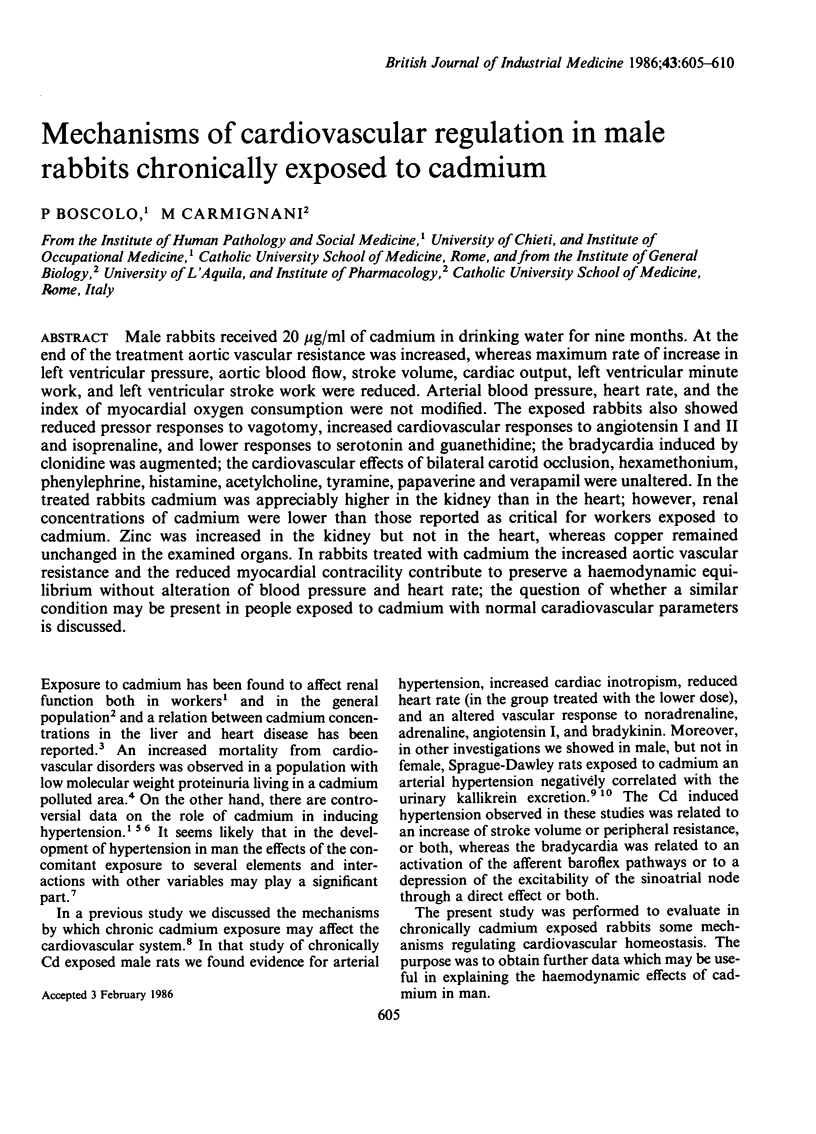
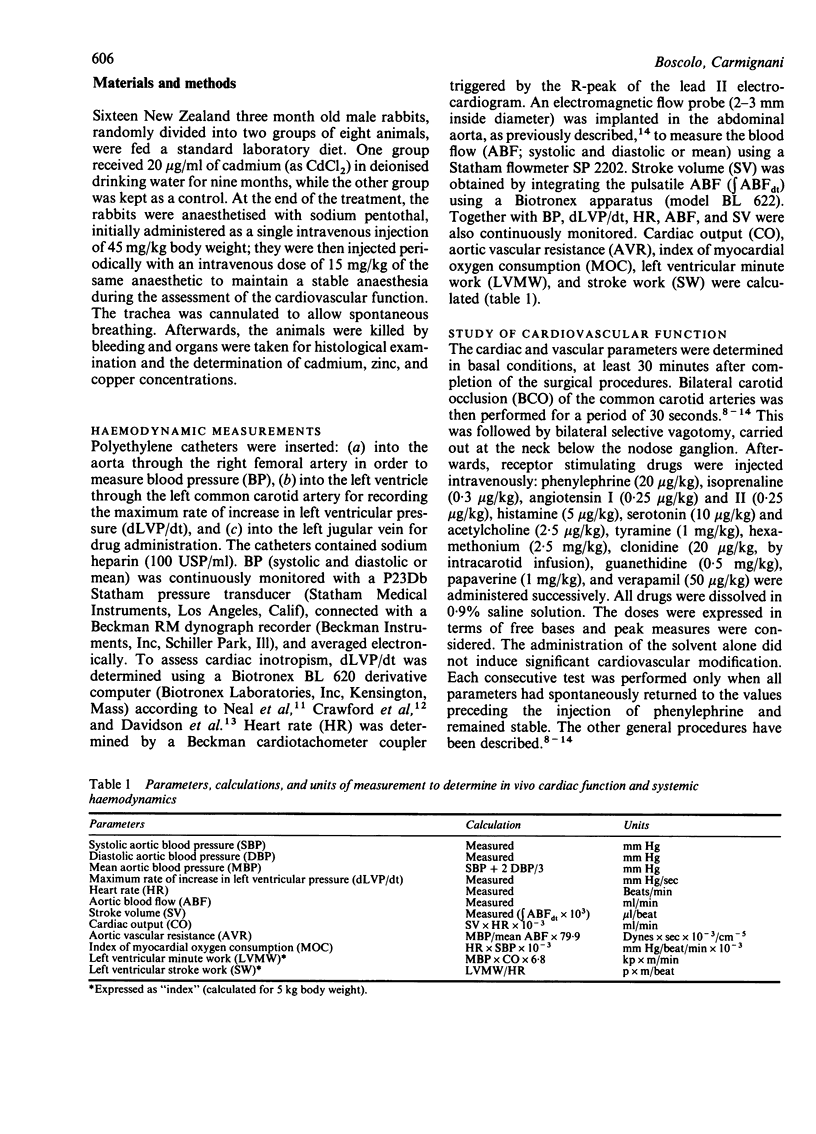
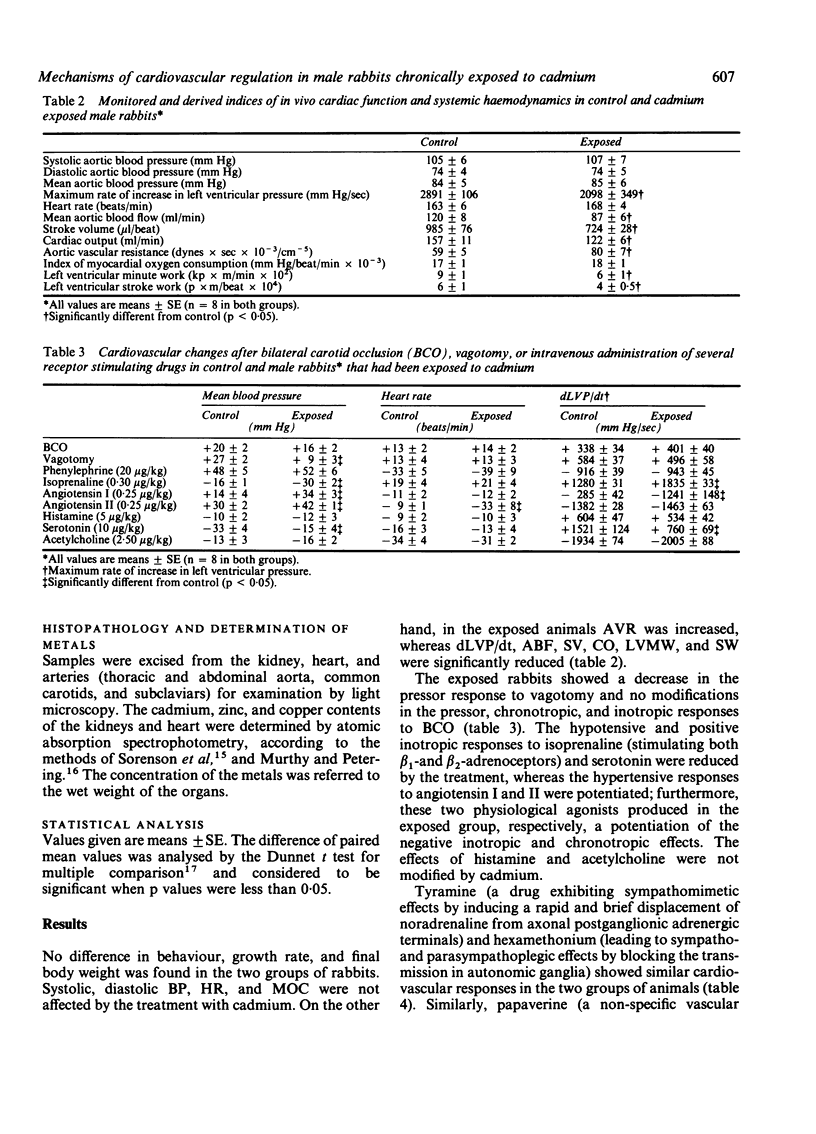
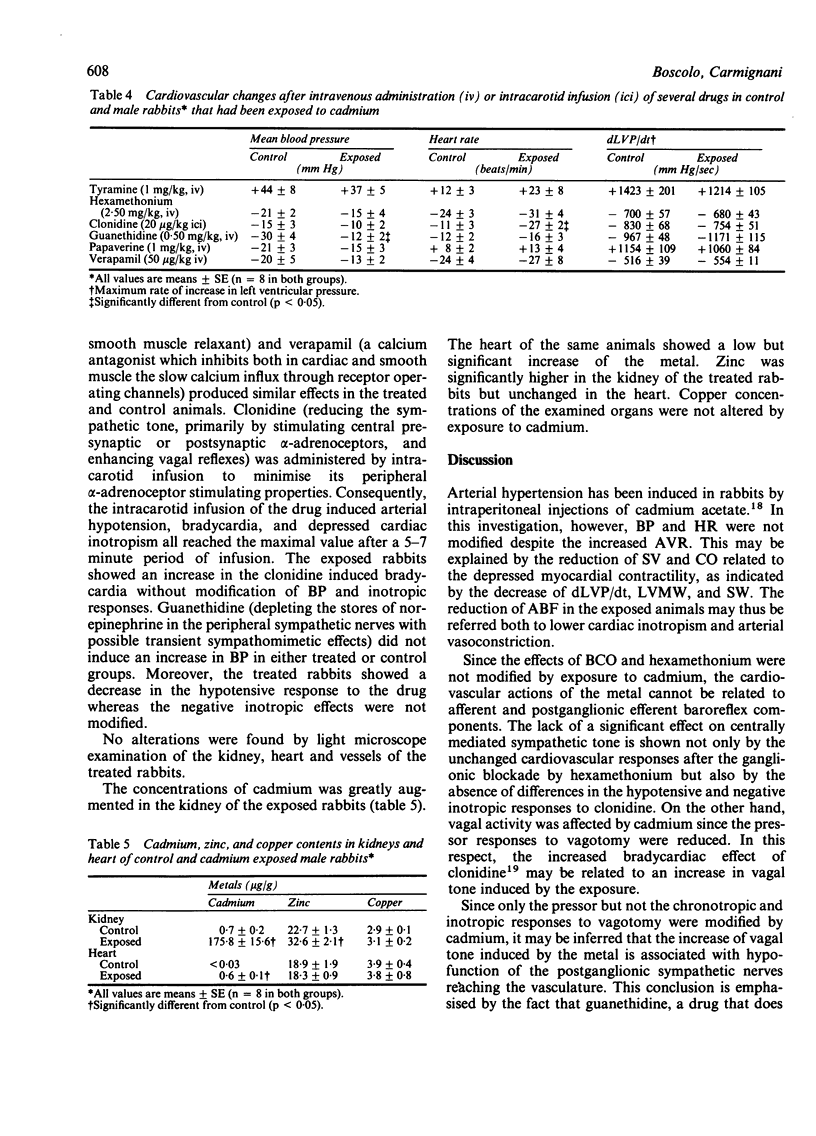
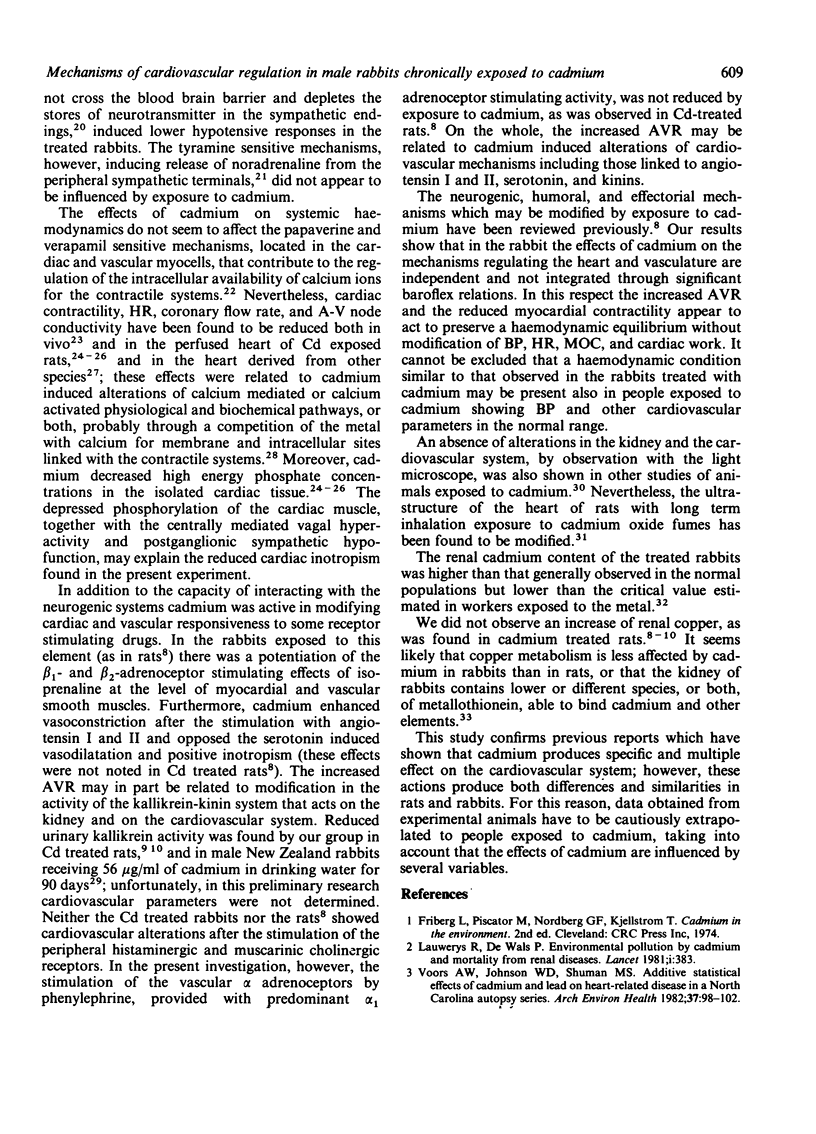
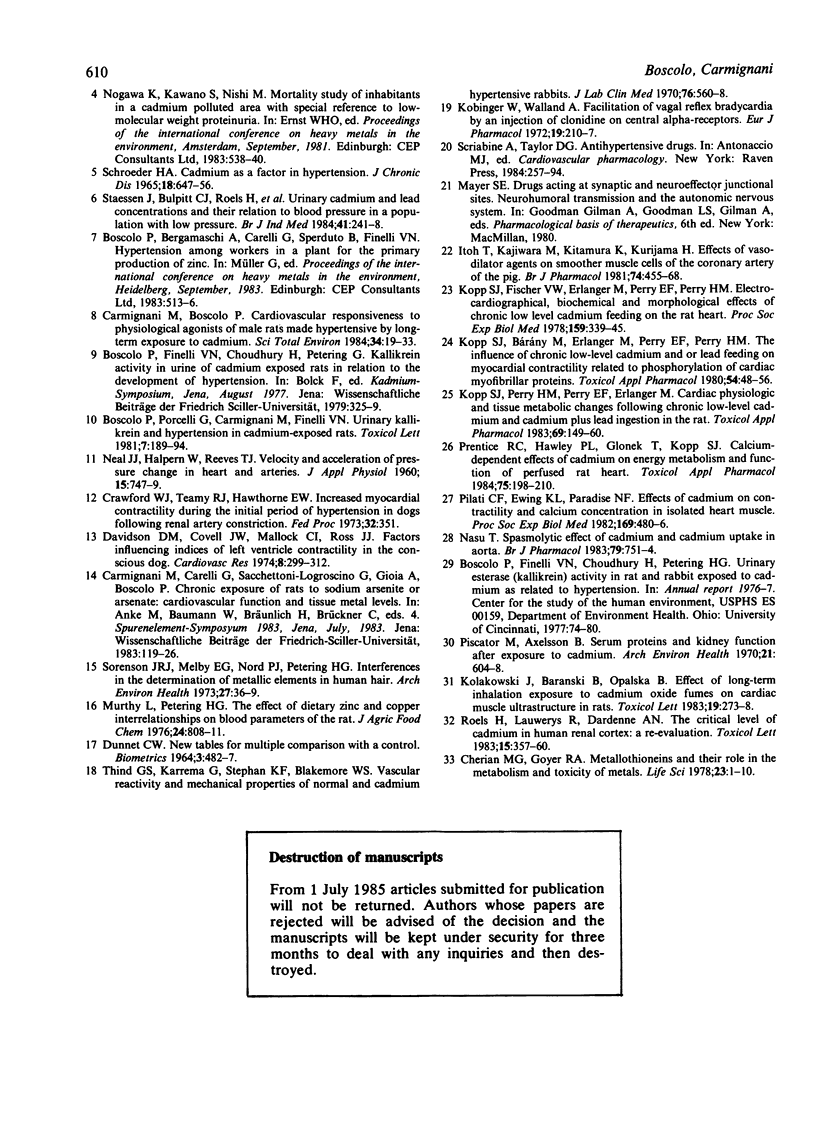
Selected References
These references are in PubMed. This may not be the complete list of references from this article.
- Boscolo P., Porcelli G., Carmignani M., Finelli V. N. Urinary kallikrein and hypertension in cadmium-exposed rats. Toxicol Lett. 1981 Jan;7(3):189–194. doi: 10.1016/0378-4274(81)90066-7. [DOI] [PubMed] [Google Scholar]
- Carmignani M., Boscolo P. Cardiovascular responsiveness to physiological agonists of male rats made hypertensive by long-term exposure to cadmium. Sci Total Environ. 1984 Mar 1;34(1-2):19–33. doi: 10.1016/0048-9697(84)90038-x. [DOI] [PubMed] [Google Scholar]
- Cherian M. G., Goyer R. A. Methallothioneins and their role in the metabolism and toxicity of metals. Life Sci. 1978 Jul 3;23(1):1–9. doi: 10.1016/0024-3205(78)90317-x. [DOI] [PubMed] [Google Scholar]
- Davidson D. M., Covell J. W., Malloch C. I., Ross J., Jr Factors influencing indices of left ventricle contractility in the conscious dog. Cardiovasc Res. 1974 May;8(3):299–312. doi: 10.1093/cvr/8.3.299. [DOI] [PubMed] [Google Scholar]
- Itoh T., Kajiwara M., Kitamura K., Kuriyama H. Effects of vasodilator agents on smooth muscle cells of the coronary artery of the pig. Br J Pharmacol. 1981 Oct;74(2):455–468. doi: 10.1111/j.1476-5381.1981.tb09991.x. [DOI] [PMC free article] [PubMed] [Google Scholar]
- Kobinger W., Walland A. Facilitation of vagal reflex bradycardia by an action of clonidine on central -receptors. Eur J Pharmacol. 1972 Aug;19(2):210–217. doi: 10.1016/0014-2999(72)90011-8. [DOI] [PubMed] [Google Scholar]
- Kolakowski J., Baranski B., Opalska B. Effect of long-term inhalation exposure to cadmium oxide fumes on cardiac muscle ultrastructure in rats. Toxicol Lett. 1983 Dec;19(3):273–278. doi: 10.1016/0378-4274(83)90130-3. [DOI] [PubMed] [Google Scholar]
- Kopp S. J., Bárány M., Erlanger M., Perry E. F., Perry H. M., Jr The influence of chronic low-level cadmium and/or lead feeding on myocardial contractility related to phosphorylation of cardiac myofibrillar proteins. Toxicol Appl Pharmacol. 1980 Jun 15;54(1):48–56. doi: 10.1016/0041-008x(80)90007-1. [DOI] [PubMed] [Google Scholar]
- Kopp S. J., Fischer V. W., Erlanger M., Perry E. F., Perry H. M., Jr Electrocardiographical, biochemical and morphological effects of chronic low level cadmium feeding on the rat heart. Proc Soc Exp Biol Med. 1978 Dec;159(3):339–345. doi: 10.3181/00379727-159-40344. [DOI] [PubMed] [Google Scholar]
- Kopp S. J., Perry H. M., Jr, Perry E. F., Erlanger M. Cardiac physiologic and tissue metabolic changes following chronic low-level cadmium and cadmium plus lead ingestion in the rat. Toxicol Appl Pharmacol. 1983 Jun 15;69(1):149–160. doi: 10.1016/0041-008x(83)90131-x. [DOI] [PubMed] [Google Scholar]
- Lauwers R., De Wals P. Environmental pollution by cadmium and mortality from renal diseases. Lancet. 1981 Feb 14;1(8216):383–383. doi: 10.1016/s0140-6736(81)91696-2. [DOI] [PubMed] [Google Scholar]
- Murthy L., Petering H. G. Effect of dietary zinc and copper interrelationships on blood parameters of the rat. J Agric Food Chem. 1976 Jul-Aug;24(4):808–811. doi: 10.1021/jf60206a048. [DOI] [PubMed] [Google Scholar]
- NEAL J. J., Jr, HALPERN W., REEVES T. J. Velocity and acceleration of pressure change in heart and arteries. J Appl Physiol. 1960 Jul;15:747–749. doi: 10.1152/jappl.1960.15.4.747. [DOI] [PubMed] [Google Scholar]
- Nasu T. Spasmolytic effect of cadmium and cadmium uptake in aorta. Br J Pharmacol. 1983 Jul;79(3):751–754. doi: 10.1111/j.1476-5381.1983.tb10013.x. [DOI] [PMC free article] [PubMed] [Google Scholar]
- Pilati C. F., Ewing K. L., Paradise N. F. Effects of cadmium on contractility and calcium concentration in isolated heart muscle. Proc Soc Exp Biol Med. 1982 Apr;169(4):480–486. doi: 10.3181/00379727-169-41378. [DOI] [PubMed] [Google Scholar]
- Piscator M., Axelsson B. Serum proteins and kidney function after exposure to cadmium. Arch Environ Health. 1970 Nov;21(5):604–608. doi: 10.1080/00039896.1970.10667303. [DOI] [PubMed] [Google Scholar]
- Prentice R. C., Hawley P. L., Glonek T., Kopp S. J. Calcium-dependent effects of cadmium on energy metabolism and function of perfused rat heart. Toxicol Appl Pharmacol. 1984 Sep 15;75(2):198–210. doi: 10.1016/0041-008x(84)90202-3. [DOI] [PubMed] [Google Scholar]
- Roels H., Lauwerys R., Dardenne A. N. The critical level of cadmium in human renal cortex: a reevaluation. Toxicol Lett. 1983 Mar;15(4):357–360. doi: 10.1016/0378-4274(83)90156-x. [DOI] [PubMed] [Google Scholar]
- Sorenson J. R., Melby E. G., Nord P. J., Petering H. G. Interferences in the determination of metallic elements in human hair. An evaluation of zinc, copper, lead, and cadmium, using atomic absorption spectrophotometry. Arch Environ Health. 1973 Jul;27(1):36–39. doi: 10.1080/00039896.1973.10666304. [DOI] [PubMed] [Google Scholar]
- Staessen J., Bulpitt C. J., Roels H., Bernard A., Fagard R., Joossens J. V., Lauwerys R., Lijnen P., Amery A. Urinary cadmium and lead concentrations and their relation to blood pressure in a population with low exposure. Br J Ind Med. 1984 May;41(2):241–248. doi: 10.1136/oem.41.2.241. [DOI] [PMC free article] [PubMed] [Google Scholar]
- Thind G. S., Karreman G., Stephan K. F., Blakemore W. S. Vascular reactivity and mechanical properties of normal and cadmium-hypertensive rabbits. J Lab Clin Med. 1970 Oct;76(4):560–568. [PubMed] [Google Scholar]
- Voors A. W., Shuman M. S., Johnson W. D. Additive statistical effects of cadmium and lead on heart-related disease in a North Carolina autopsy series. Arch Environ Health. 1982 Mar-Apr;37(2):98–102. doi: 10.1080/00039896.1982.10667544. [DOI] [PubMed] [Google Scholar]


